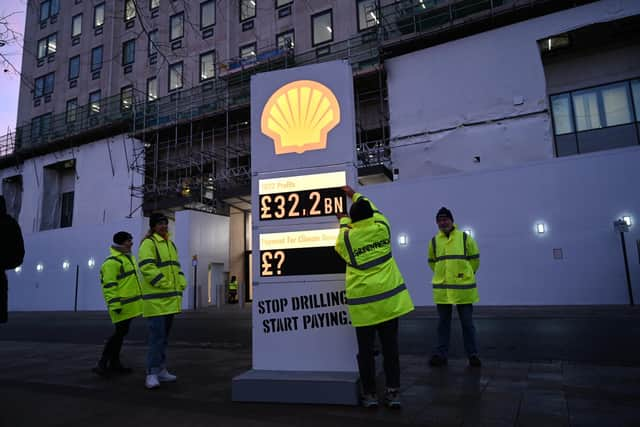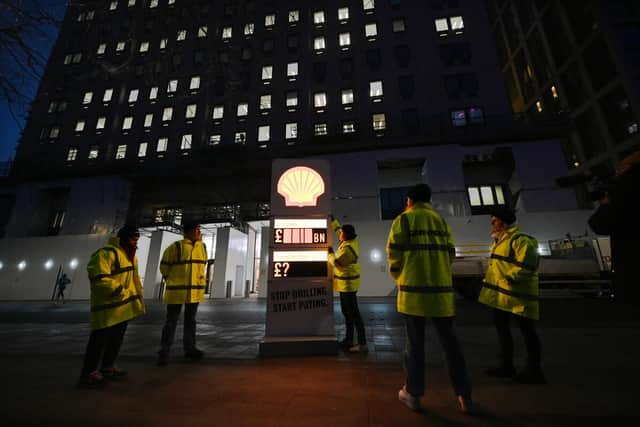Shell oil record profits: Greenpeace protesters target London Waterloo headquarters
and live on Freeview channel 276
Greenpeace activists responded to record profits recorded by Shell with a mock petrol station sign at the fossil fuel giant’s Waterloo headquarters.
With households facing rapidly rising costs, including energy bills which have jumped up since Russia’s invasion of Ukraine, the company posted annual profits of £32.2bn ($39.9bn). The figure has led to fresh calls for an expansion of the windfall tax on energy companies.
Advertisement
Hide AdAdvertisement
Hide AdGreenpeace protesters set up a huge, mock petrol station price board outside the company’s offices on Thursday morning (February 2), questioning its contribution towards paying for climate loss and damage.
Senior climate justice campaigner for Greenpeace UK Elena Polisano said: “Shell is profiteering from climate destruction and immense human suffering. While Shell counts their record-breaking billions, people across the globe count the damage from the record-breaking droughts, heatwaves and floods this oil giant is fuelling. This is the stark reality of climate injustice, and we must end it.
“World leaders have just set up a new fund to pay for the loss and damage caused by the climate crisis. Now they should force historical mega polluters like Shell to pay into it. It’s time to make polluters pay. If they had pivoted their business and transitioned away from fossil fuels sooner, we wouldn’t be in such a deep crisis. It’s time for them to stop drilling and start paying.”
Announcing the financial figures, Shell PLC chief executive officer Wael Sawan said: "Our results in Q4 and across the full year demonstrate the strength of Shell's differentiated portfolio, as well as our capacity to deliver vital energy to our customers in a volatile world.
Advertisement
Hide AdAdvertisement
Hide Ad“We believe that Shell is well positioned to be the trusted partner through the energy transition. As we continue to put our Powering Progress strategy into action, we will build on our core strengths, further simplify the organisation and focus on performance. We intend to remain disciplined while delivering compelling shareholder returns, as demonstrated by the 15% dividend increase and the $4 billion share buyback programme announced today."


Four Greenpeace activists from climate-impacted countries are currently occupying a Shell oil and gas platform in the Atlantic Ocean as it makes its way to the North Sea Penguins field. The activists boarded the platform near the Canaries from Greenpeace ship Arctic Sunrise.
Virginia Benosa-Llorin, a Greenpeace Southeast Asia climate justice campaigner currently on board the Arctic Sunrise, said: “Where I’m from, San Mateo, Rizal, in the Philippines, got battered by typhoon Ketsana in 2009, which killed 464 people and affected more than 900,000 families, including mine.
“My husband and I saved up for years to buy our own home, and tightened our belts to furnish it, bit by bit. Then came Ketsana. In one sweep, everything was gone. Watching the water rising rapidly while we were trapped in our tiny attic was horrible; I felt like the rain wouldn’t stop. The only escape was through the roof, which my husband started to break. It was a long, horrendous day.
Advertisement
Hide AdAdvertisement
Hide Ad“People in the Philippines are suffering greatly despite the country’s tiny contribution to climate change, and that is an immense injustice. Carbon Majors like Shell are harming our lives, livelihoods, health, and property by continuing to drill for oil. They must stop this destructive business, uphold climate justice, and pay up for loss and damage.”


Victorine Che Thöner, a Greenpeace International climate justice campaigner who is also on board the Arctic Sunrise, said: “My family in Cameroon is living through long periods of droughts that have led to crop failure and increased living costs. Rivers are drying up and long-awaited rains don’t come. When the rains do finally fall, there is so much that it floods everything – homes, fields, streets – and again people struggle to adapt and survive.
“But this crisis is not limited to one part of the world. I live in Germany and, last year, so many crops dried up because of long heatwaves and drought – my own fruit and vegetables that I was growing in my little field perished – and forest fires ravaged fauna and flora and caused air pollution.
“There is one major actor fuelling the parallel climate, nature and cost of living crises: fossil fuel companies. It’s time to build new ways of living and collaboration that work for people, not polluters, and that restore nature rather than destroy it.”
Advertisement
Hide AdAdvertisement
Hide AdIn response to the protest at sea, a Shell spokesperson said: A Shell spokesperson said: “These actions are causing real safety concerns, with a number of people boarding a moving vessel in rough conditions. We respect the right of everyone to express their point of view. It’s essential they do that with their safety and that of others in mind.
“Households, motorists and businesses need a stable supply of oil and gas, which remain a key part of the UK energy mix as we build more renewable power. Projects like Penguins are vital to that supply and help reduce the UK’s reliance on higher carbon and costlier energy imports. Locally-produced, responsible oil and gas production is critical for UK energy security and entirely consistent with a net zero pathway as modelled by the UK’s independent Climate Change Committee.
“After decades of supplying oil and gas, output from the UK North Sea is tailing off and now meets less than 50% of the UK’s demand. It is important to stop it tailing off too steeply, while the transition to low-carbon energy gathers pace. The new floating vessel will allow production from the Penguins field to continue to provide the necessary energy that the UK needs. It is not a new field, but one which has already been producing oil and gas for 20 years.
“We plan to invest up to £25 billion in the UK energy system over the next decade, providing individual projects remain economically viable under the revised tax regime, and subject to board approval. More than 75% of this is intended for low and zero-carbon technology, including offshore wind, hydrogen and electric mobility.”
